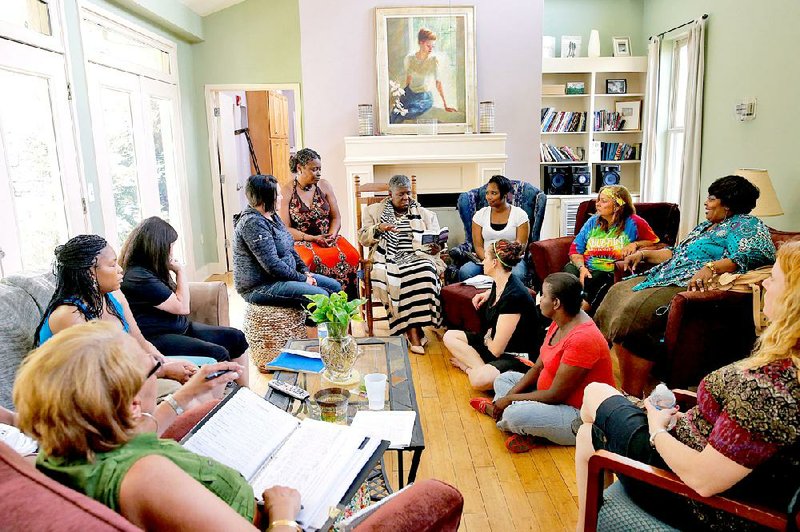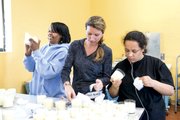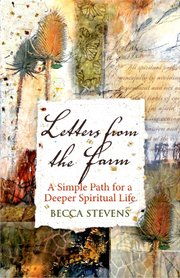For the Rev. Becca Stevens, the thistle is much more than a bothersome weed. She sees the prickly plant as a metaphor for the women she ministers to and works alongside at Thistle Farms in Nashville, Tenn.
Thistle Farms encompasses Magdalene, a residential ministry for women who are survivors of human trafficking, addiction and prostitution, and a business enterprise that teaches the women how to manufacture, market and sell bath and body products.
Thistle Farms
Magdalene Sanctuary House
St. Paul’s Episcopal Church, Fayetteville
lovehealsfayettevil…, 442-7373
Letters From the Farm
A Simple Path for a Deeper Spiritual Life
Author: The Rev. Becca Stephens
Publisher: Morehouse Publishing
Stevens said she sees the tough exterior and inner beauty of the women at Thistle Farms.
"When I started going down to the street where the women were walking and sleeping and turning tricks, the thistle was the last flower that was blooming," Stevens said. "They have this thorny exterior that's prickly, but also this deep, beautiful, soft purple center. It's a good metaphor for how the women appeared to me."
So she adopted the thistle for the name and logo for Thistle Farms.
Magdalene was started in 1997 and Stevens, an Episcopal priest, decided to start the business arm of Thistle Farms in 2001 as a way to give the residents economic stability.
"Most of these women had never had a paycheck or a job," she said. "We decided to make healing products for the body -- all natural, beautiful, luxurious and lavish -- and they've helped women buy cars, purchase homes, go back to school and get their children back."
And, just as the women of the ministry have been transformed, Stevens has transformed the prickly thistle -- into paper.
"It makes great paper. It has a strong fiber but is soft and silky," she said. "You can harvest thistle all over the world. You don't have to have a set farm. The world is your farm, and it makes sense theologically and practically and it makes sense businesswise, too. We have zero costs of goods for our paper. We turn the trash in this world into a commodity and sell it on the open market."
Stevens said Thistle Farms receives no government funding and all support comes from donations. It's an idea based on gratitude.
"It's so simple," she said.
LOVE LETTERS TO GOD
Stevens writes about the work at Thistle Farms in her latest book, Letters From the Farm: A Simple Path for a Deeper Spiritual Life (Morehouse Publishing). She started out thinking she was writing to specific people -- to the young seeker looking for answers, to the woman in prison or to the women of Thistle Farms.
"I finally decided these were love letters to God," she said.
The letters are stories from her travels around the world telling others about the work of Thistle Farms and about the lessons she has learned from the women there.
"All of us have a story," she said. "All of us have brokenness, and we face that. We could be bitter, but instead we grow compassion so we can live in a world where love heals."
Stevens said her belief in the healing power of love comes from working side by side with women who have pulled themselves out of the depths for 20 years.
"I have learned that I am always surprised by resurrected lives," she said. "That never gets old."
In Letters From the Farm, Stevens talks about a farmer's theology, which she calls a simple, down-to-earth form of faith. It's one she has found at Thistle Farms.
"To me it means it's a theology that's practical, that wants to bear good fruit and multiply," she said. "That you throw seed on soil and then you remember you are the dirt."
She said Jesus used stories of dirt and seeds to teach courage and humility.
"[He taught] that we have to be courageous enough to overturn the hard, dry ground within us and throw away the rocks of cynicism and fear so we can have good soil to grow faith," she said. "It takes a lot of courage and humility. What's more humble than dirt? It's that old saying, 'You never see a U-Haul behind a hearse.' We do return to the earth. That's so humbling, but so freeing, if we allow it to be a gift."
The Thistle Farms movement has grown to include 22 sister communities. Thistle Farms products are sold in 480 stores throughout the country and the enterprise has 18 global partners.
OFFERING SANCTUARY
One of those sister communities is in Fayetteville, where parishioners of St. Paul's Episcopal Church are starting their own Magdalene Sanctuary House.
The Rev. Lowell Grisham, rector of the church, said parishioners at St. Paul's had been working with women incarcerated in Northwest Arkansas when they heard about the ministry that Stevens was doing in Nashville.
"When we had to bury one of the women who had been in our program, who we just loved, after she got out and basically went back to the place that got her in trouble in the first place, we said we need to do something," Grisham said. "In talking with women as they were finishing [their sentences], so many of them didn't really have good options to return to, jobs waiting for them, a safe place, a network to help."
One of the church's clergy members, the Rev. Suzanne Stoner, took a team to Nashville to learn about what Stevens was doing. They decided to copy her model.
"It's been successful. It's the best thing going," Grisham said. "We continued to send teams there on regular basis, and we decided we would initiate a Magdalene program here in Northwest Arkansas."
The church has since procured a house, which will be renovated into a home for six to eight women. They are also working with students in the Walton College of Business at the University of Arkansas to develop a business enterprise for the women like the one at Thistle Farms.
Stevens and some of the women from Thistle Farms visited the church this spring as part of a fundraiser that raised more than $10,000 for the St. Paul's ministry.
Grisham said Stevens has been an inspiration.
"She is so frank and bold ... and she has a calling to help women heal and to escape abuse, trafficking and addiction," he said. "She has an extraordinary entrepreneurial spirit and great business sense and we felt very affirmed after her visit."
For now, the setup of Magdalene Sanctuary House in Northwest Arkansas continues. Grisham said a woman who will be the first resident came out of being trafficked. She went to live in Nashville to "absorb the Magdalene ethos," he said, and she will help set the foundation for the program in Fayetteville.
Grisham said the church has filed for nonprofit status and hopes to make the ministry a community project, not just a St. Paul's or an Episcopal Church project.
"We would love to connect with people from Northwest Arkansas who might like to learn more or come share in our work," he said.
The parish has had experience in expanding ministries beyond the church. What began as St. Francis House, a free health clinic at the church, is now known as the Community Clinic, with 13 locations throughout Northwest Arkansas and a staff of more than 200. The church also started Seven Hills Homeless Center, which later became its own entity.
For Grisham, it's all part of what the church is called to do.
"It is the church's and the community's responsibility," he said. "We are all complicit in a society where children grow up without some of the basic supports for their security, health and well-being. And when children are abused, when they are exposed to addictive substances at an early age, when their development is injured or arrested, it's up to the rest of us to provide the structure for and community for their healing."
As for Stevens, she said healing, like that experienced at Thistle Farms, is the most important sacrament of the church.
"Everything else is a facet of healing," she said. "Burial is a form of healing. Marriage and reconciliation, they are all parts of how we heal. Healing gets translated into miracle cures -- take this pill and you'll be healed. I don't mean that. I mean this intentional way of walking toward wholeness. We can use all the sacraments -- baptism, Communion -- all of them toward this intentional walk to wholeness, this return to God that is healing."
Information about Thistle Farm is available online at thistlefarms.org. Information about Magdalene Sanctuary House, the outreach of St. Paul's, is available online at lovehealsfayetteville.org or by contacting Suzanne Stoner at (479) 442-7373.
Religion on 08/22/2015



